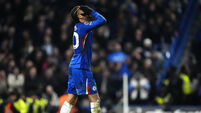Otto mulls over king’s ransom
Will it be the controversial "King Otto" Rehhagel of Greece? Have they, the German FA, the courage to invest their future in a man who is notoriously unpopular in his native Germany, even if today he is the number one man in Greece.
Rehhagel is acknowledged as one of the most successful coaches ever to work in the Bundesliga but has not won many friends along the way. He has been variously described to me by German contacts as a "control freak" and a "dictator" who is intolerant to the point of rudeness with anyone offering an alternative point of view.














